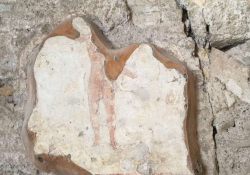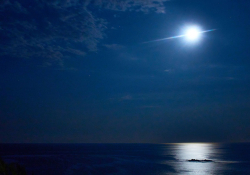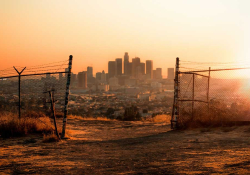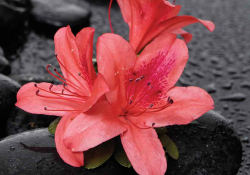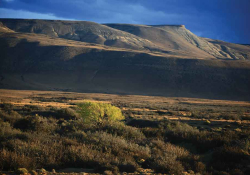My Friends, They Did This, Too
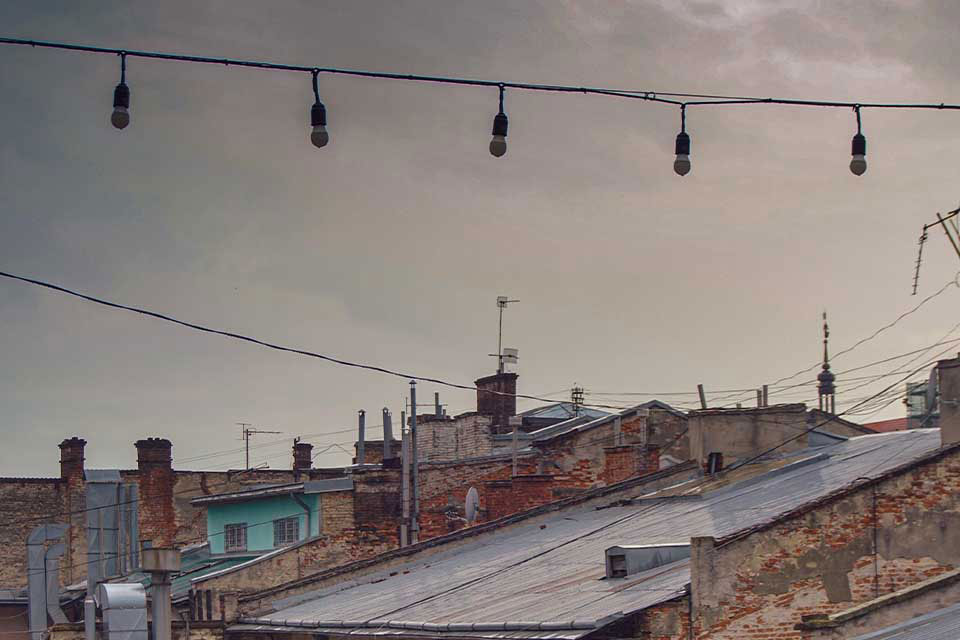
Franco’s legacy falls across a celebration of two friends’ birthdays but fails to stifle the hard-earned, uncontainable, savored joy.
Up four flights of marble steps, mi roomie and I arrived on the landing. There, we found the empty box of laundry soap, left out by the quiet, rarely appearing neighbor guys whose door faced ours. Straight men. The detergent brand was Elena. Mi roomie told me to pose beside it. I hammed it up for her lens, the beloved friend on the other side of its convex glass. Elena and her name, vouched for by the laundry soap! she said. Ellen? Never heard of her. Another click of her camera, corroborating.
Our apartment had a washing machine, and since we were on the top floor, it was easy to carry a hamper of wet clothes out to the building’s shared rooftop terrace sliced by clotheslines, the plastic pinchers dangling from a shopping bag.
Maybe that’s where we got the idea for the party, on the birthday mi roomie and I nearly share, the dates separated only by the tick of a second hand at midnight. Our tandem midnight fell on a weekday during Holy Week, which doubled as a prime time for unreligious, off-work queers to gather. Mi roomie pulled up her graphic-design skills to make an invitation: her dykey work boot facing my go-to cowboy boot, and a Castilian line along the top reading, “Walking toward the future we’re seeking.” I dusted off my dormant zine-making habit, and we spent an afternoon writing, collaging, and then photocopying a little party-favor zine. And then came the decorations.
Out of cardboard, we fashioned two huge sculptures of the new ages we’d be celebrating: hers a 26, mine a false 22.
***
I’d lied about my age, and there was a freedom in not being eighteen. Absorbed into my friendships with her and our huddle of queer twenty- and thirtysomethings, I could bypass my lifespan’s interim, clock in on the other side of an uneasy, Protestant adolescence. Among these older artists, eating chips or jamón serrano sandwiches on nudist beaches, I heard about the balance between a day job and the cost of renting warehouse space for art studios. I heard how the violence of Franquismo persisted; I learned not to be fooled by numerical markers like passing decades. The Opus Dei. The compulsory Christian names for anyone my friends’ age or older. The anti-Muslim parades and fascist salutes filling avenues each January to mark the expulsion of the Moors. Grandmas who still displayed a portrait of Franco. The awfulness that gave way to authoritarianism was still here among us, I was warned. I’d felt it, too: the watermelon hurled from a balcony as a butch friend and I crossed a plaza, the splash of its guts at our ankles.
I heard how the violence of Franquismo persisted; I learned not to be fooled by numerical markers like passing decades.
I learned nightlife. Ir de marcha. We often ended our extravaganza at a huge, wondrously mulletted lesbian bar run by a couple in their forties; one woman manned the door, the other the alcohol. Every night was a prom repeated: the same slow “last dance” song, the cheesy opportunity to close out the madrugada hours with that special someone, whether for the fun of the dance or something more. ¡Viva el rollo bollo! we’d holler as we stumbled home, rapt in its long-living. I was high. Come daylight, the city grew smaller and smaller. Women I’d eyed in the dark, I felt shy to cross in a plaza. Other nights, in a minuscule men’s bar, I copied my friends’ orders of gin-tonic. I watched many of them pocket the free condoms and find looseness in the dancing. Two men I admired told me about their serodiscordant partnership; the virus was always there, but so was the way they treasured each other.
Back home at daybreak I did as I’d been advised, draping my clothes over the balcony to air out the cigarette smoke. Over tostada de tomate and café con leche breakfasts, I heard about divorce, or new films from China or Norway playing at the cinema, or discernment about remaining childless. In the afternoon, we gathered on an apartment’s terrace with a huge sheet of butcher paper to try our hands at what we’d seen in “La Ele Word,” the dubbed version of the lesbian melodrama The L Word: an “Our Chart” with little bubbles of each queer woman and who she’d slept with, like a plaid gone awry. Friends ran fingers over the lines between my own name and others’, clarifying the odd tensions I’d felt at the bar. Ajá. I also heard about making the most of unemployment checks, at a time when two in ten of our group were en paro.
After siesta, I went to the gig a friend helped get me at a little basement bar, playing piano improvisation in exchange for gin-tonics, which I’d rest on a coaster on top of the piano, taking sips as each song came to a close on its own. When that shift was up, I’d carry my glass over to join whichever friends journeyed down the basement’s steps, slipping back into a noisy conversation. Around those pushed-together square tables, I heard about architecture, atheism, parochial abuse. Affairs.
Around those pushed-together square tables, I heard about architecture, atheism, parochial abuse. Affairs.
Everyone was having one or ending one. Rekindling one. On a walk down an arterial street, a friend pointed up to a balcony. “That’s where she lives.” She was the woman who played soccer with us; she was the same woman our other friend was years deep into a hidden relationship with. Our dear friend, her big eyes, big tears. Her discretion—sitting beside her for months at a wooden-paneled bar before she finally said, “Elena, te tengo que contar una cosa,” then told me with such brevity the condition of her heart and the circumstances that got her there. That she was irreparably in love with an exceptional woman, one she knew she’d never have.
I followed the pointed arm up to the brown, boring building, the dark grille of its balcony. There? That was the address that caused our friend such sadness?
But I’d have the sadness too, soon enough: the confusion, the recognition, the pulling away. The knees under the table. A woman older, driven, a smoker. A warm and terrifying wonder. The strangeness of what moved between us. The swoon-worthy seconds where she lingered on the cobblestones as the end-of-night sounds came, the metal clattering of gratings coming down as the bars closed. There, in that liminal hour, when I felt the fullness of her lips against my face, the plausible deniability of kisses-on-the-cheek goodbye. The public moments, too, when she’d retreat from a full table’s conversation, bring me in, say, “¿Elena, entiendes?” and explain without fuss the backstory or nuance. The way that word entiendes was also slang for being queer; yes, I understand. One-on-one, she’d say it differently—¿Me explico?—her generous frame for my Castilian shortcomings. It wasn’t that I didn’t understand, she insisted; it was that she hadn’t explained herself. And as we moved deeper into each other’s lives, then bodies, that seemed to be the catch. It wasn’t that someone wasn’t understanding; it was that someone wasn’t explaining it right. I understood she was committed to another. She didn’t explain how she would stay that way.
***

Finished and thrilled, we propped our 26 and 22 against the entryway wall. Our ages would greet every guest who ascended the marble steps, long worn concave. Then, on to the list of musical requests: Mecano’s “Maquillaje,” Astrud’s “Bailando,” Fangoria’s “Electricistas,” Los Salvajes’ “Las Chicas Son Guerreras,” the translated-English crowd pleaser, “Let’s Play Hippies,” with its notable line Let’s be lesbians tonight. And of course: Madonna’s “Hung Up.”
These were songs that I’d learned from others and absorbed through repetition. Right after moving in with mi roomie, my little off-brand mp3 player had died, as had the disc drive in my laptop. So I was left to mi roomie’s CD collection and the kindness of friends who burned me mixes, which I’d listen to on the living room’s DVD player, often in company. I filled myself with others’ preferences.
Out in the street, when I wasn’t listening to what was around me or the buzz in my head, I had a sky-blue, palm-sized portable radio. I tuned it to the flamenco station, where I’d tap out the counts of twelve, the soleá or the bulería I’d been studying in class. An accent so handsomely andaluz, the accent I myself was living into, in a way I’d not be aware was special until a short trip to Madrid reflected back the difference. I bought two CDs in my time in Granada—a splurge at seventeen euros each—from the record store on Gran Vía. I’d asked my flamenco instructor to recommend names of women, of cantaoras. He told me Estrella Morente’s Mi cante y un poema and Mayte Martín’s Querencia, mentioning, as if offhanded, that the latter was lesbian.
My friends were post-Movida modernas. Though they still had to calculate large sums of euros back into pesetas, they also gave me grief for liking something as old-timey as flamenco, something folklórico. It was also the patrimony of gitano people, a community apart from the one in which I lived. But across eras and identity, when I listened to a siguiriya, it was the opposite of the miraculous healing that believers back home expected of me. I found that pain could be overwhelming without being overcomplicated or acted on. Like a sevillana lyric—lo tiré al pozo / lo tiré al pozo / no quiero claveles de ningún mozo—a carnation from an intimate who’d turned out to be an asshole was enough to drown my heart in a well. But I didn’t need to pray away any awfulness. I could just listen, let it sing.
I craved porousness. Maybe it was my age, or maybe it was that I so loved that world that I wanted to let it fully in.
I craved porousness. Maybe it was my age, or maybe it was that I so loved that world that I wanted to let it fully in. Unlike the way songs enter me now, music came from others’ recommendations, gifts, traditions. Others’ homes. Radio stations. Nightclubs. Running up to the DJ at the lesbian bar with our big grins.
Or DJs in living rooms. The night of the birthday party, our architect friend had agreed to DJ; he’d started moonlighting in little queer-leaning bars. He arrived early with huge binders of CDs, a thick laptop of downloaded music, ginormous headphones. We cleared out the furniture and fashioned him a makeshift DJ booth in the corner. And over the emptied black- and-white tiles, we strung green clothesline from kittycat corners, borrowing for the night clothespins from the rooftop’s stash to hang bras and lacy underwear throughout the living room.
And then our friends arrived, dancing between lingerie and laundry lines. I twirled on my boot heels among them. At midnight exactly, the music cut and the world I loved, the world that loved me back, erupted into Cumpleaños feliz. Our closest friend brought in the cake: a surprise, custom-ordered torso of a big-boobed woman, complete with curls of black frosting at her crotch. Te deseamos todos—a camera came out: our arms around each other as our friend held the cake, mi roomie and I laughing too hard to blow out the candles. Not shown in the photo: both of us nearly pissing our pants. The music back on, rounds of kisses with everyone—felicidades, congratulations on your birthday. Squeezed so, so tight.
Later, the woman who said, “¿Me explico?” would kiss me in the brief privacy of the small kitchen as her partner danced among the heat of our friends down the hall.
I am a bad person, I knew in an English louder than the music someone else had chosen. Smiling, she slipped out of the kitchen. I am as bad a person as they said I was. If our friends had caught us kissing, would I have gotten kicked out of the party?
No: my own home. Mi roomie had added Elena Adams on the entryway mailbox. Elena as a soap. No, I told myself with each cowboy-heeled step back down the hallway, past the 22 and 26, returning to my crew. My friends did this too, right? Weren’t we all liars?
Four stories below the open French doors of the balcony, Semana Santa processions passed. The boom of brass and snaring drums full-on now, the pause for a solo-voiced saeta and its virginal sorrows finished an avenue ago. The terrifying capirotes, their cone hoods, their meter-long candles, their satin numbers and bare feet. Their display, a penitence so great that tradition tells them to hide their faces. Black-veiled women and robed, masked men, flanked by military, carrying the gory weight of the show: floats of holy statues and floral sculptures to mark a resurrection.
Above: our beautiful hedonism. Our hard-earned, savored joy. Survival as rebuttal. Everything around me, every detail and bursting feeling, a joy in this room that couldn’t be contained by this room, every impossible gift of a grin said, This is it. This is really it.
And yet, down the marble stairs, past the entryway mailboxes, out into the streets, as the swells continued their processions, I knew we were outnumbered. Beneath us, susto-giving men and mantilla-laced women made their way, across pavement and cobblestones, many on their knees. What bruises. But my friends, their beatific carrying on, they didn’t seem to notice.
Tiohtià:ke

